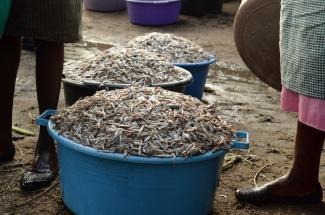Kenya
Sex for fish

On a late Friday evening in October 2017, I finally arrived in Mbita, one of the many fishing beaches on the shores of Lake Victoria. This will be my home for the next few weeks and I am looking forward to enjoying the delicious highly praised Tilapia and Omena (a type of sardine). Even though the area is not fully electrified, I noticed that on the far horizon there were many little lights and I wondered what city that was! My host informed me that actually that was no city, that was the mighty Lake Victoria and the lights were solar lamps that fishermen use.
Omena, the major catch in this region, is fished at night with the aid of solar lamps. Fishing is done with wooden boats and fishing nets that resemble mosquito nets. One fishing boat is manned by at least four muscular men who are employed by the boat owner. The fishermen spend most of their nights on the lake and they mostly sleep during the day. My host informed me with hard winds blowing, pulling fishing nets requires considerable physical strength, and only strong men can do the work.
Early Saturday morning, my host and I headed straight to the nearby fishing beach. Tired fishermen were pulling ashore the catch of the day. Some boats were half full and some full to the brim. Women were eagerly waiting to buy their share of fish for the day. Like in many other fishing communities, the division of labour in Mbita is traditionally defined and observed; the men fish and the women dry the fish and sell them at the local markets. Some sell them to middle men who collect and transport the Omena in large quantities to major markets as far away as Mombasa. As on many other inland fishing beaches, the fishermen sell less fish than the female fish traders want to buy.
At the beach, I met Akinyi (not her actual name). She is 26 years old and has three children. After the death of her husband, she left her husband’s home in the inland area and moved to Mbita because she did not want to be “inherited” by her brother-in-law. Wife inheritance is a custom of the Luo, who are the major tribe living on the Kenyan shores of Lake Victoria. Even though the custom is slowly fading away, there are some families that still uphold it.
Akinyi is not familiar with the term “sex for fish”, but she says that everyone knows the local term “Jaboya”. In the Luo language, Jaboya refers to a floater attached to a fishing net that helps the fishing net stay afloat even when loaded with fish. Fishermen who help female traders secure the catch are also called Jaboya because they are like a floater, they help the women secure access to fish. Akinyi says that due to the tough competition to secure access to the limited catch, a Jaboya is like a bridge between her and the merchandise. She says it is a common practice in Mbita even though people do not openly talk about it. In exchange for sex, female traders are given priority to buy Omena, and a woman without a Jaboya will have to wait and hope for the surplus in order to get some fish.
When asked if she has a Jaboya, Akinyi shyly nods. After relocating to Mbita, selling Omena was the only hope to earn a living in order to support herself and her three children. In the beginning she refused to join the Jaboya system, but after many days of disappointment and going home without any catch, she changed her mind. Stiff competition for the limited fish left her with no other choice. Like many other female fish traders, Akinyi opted for a sexual relationship with a fisherman due to poverty and desperation. She mentioned that she has multiple Jaboyas in different fishing beaches. During my stay, I spoke with some of Akinyi’s friends and other female fish trades, who narrated similar experiences with Jaboya.
While walking around Mbita one cannot miss to notice the many posters and billboards with information aiming to raise awareness of HIV and AIDS. There are also several tents in strategic places and at the beaches where people can be tested for free and sent to a health facility for treatment. HIV awareness raising is also done through door to door campaigns, roadshows and on local radio programmes. Condoms are provided free of charge and placed in condom dispensers at the fishing beaches. However, many women said that they do not use them. For example, even though Akinyi was aware of the condom dispensers, she has never picked a condom from them. She does not want to risk being seen collecting condoms. She fears people will look down on her and the community will consider her immoral.
Women also mentioned that it is very common for fishermen to consume a lot of alcohol and it is extremely difficult to negotiate condom use with a drunk fisherman. Many studies on sexual behaviours have linked alcohol consumption to risky sexual behaviour. Akinyi said that, on several occasions, she had to forgo the use of a condom because her Jaboya threatened not to sell the fish to her if she insisted on using condoms. For a long time, she was very scared of getting tested for HIV, but during of one of the door to door HIV testing campaigns, she decided to get tested. She tested positive for HIV and since then she has been enrolled in HIV care and treatment. However, in the past four months, while looking for fish, she has been moving between five fishing beaches. The frequent movement interferes with her appointments at the health facility. She sometimes misses appointments and fails to go to refill her medications.
Akinyi’s story is similar to those shared by many other female fish traders that I met. Even though most of them are aware of the availability of HIV prevention, treatment and care and understand the benefits, they did not make full use of them. Moreover, many of the women who had a Jaboya did not feel at high risk of contracting HIV. They did not consider themselves as being involved in a form of prostitution or transactional sex as they would commonly be labelled. Most of the women had long-term relationships with the fishermen and some mentioned that having a Jaboya was like having a boyfriend or a husband. Sometimes, fishermen would live with the woman for a few weeks and she would cook and wash for him. In such relationships, those involved did not see reasons to use condoms or even test for HIV.
In Kenya, sex for fish has been identified as one of the leading causes of the high HIV incidence among the fishing communities around the Lake Victoria region. According to the Kenya HIV County Profiles published by the National AIDS Control Council in 2016, HIV prevalence rates were highest in the counties around Lake Victoria. For example, in Homa Bay county (which includes Mbita) the HIV prevalence rate was 26 %, almost four times the national average of 5.9 %. The situation is similar in other fishing communities of some sub-Saharan African countries, especially among the inland fisheries. In spite of the vast HIV prevention and treatment initiatives, a number of studies have identified concentrated epidemics among fishing communities in Uganda, Tanzania and Malawi.
To achieve the Agenda 2030 goal on ending the AIDS epidemic, every country should work on reducing the HIV prevalence among its key populations and also offer care and treatment. There is need to develop and scale up innovative and target-oriented prevention, treatment and care services. In particular, the interventions need to respond to the needs of the local communities. For example, women in Mbita mentioned that sometimes there was “moonlight HIV testing”. People could get tested at night and without having to worry about being spotted by friends and family. However, such initiatives are not carried out regularly. Also, for a highly migratory community like the fishing communities, it is important to offer mobile health services so as to bring services closer to those in need. Scaling up of such interventions would go a long way in the fight against HIV and AIDS.
Brenda Mbaja Lubang'a is a graduate from Ruhr University Bochum, Germany, where she earned a masters degree in development management. Her masters’ programme is affiliated to AGEP, the German Association of Post-Graduate Programmes with Special Relevance to Developing Countries.
mbajabrenda@gmail.com












